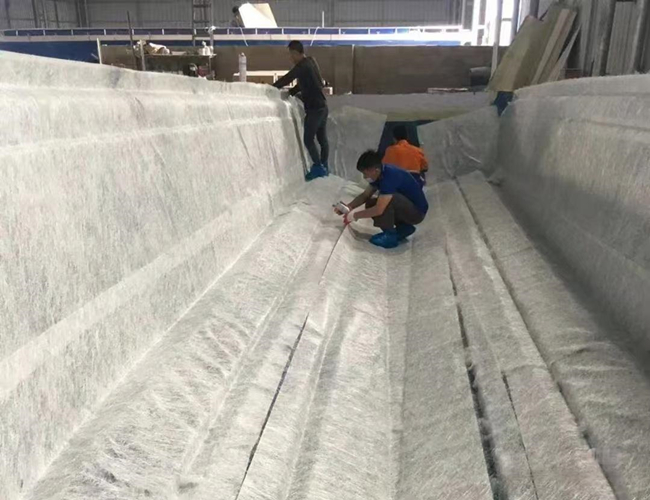Fiberglass materials have revolutionized industries by offering strength, durability, and versatility. Among the most prominent fiberglass reinforcements are chopped strand mat (CSM) and fiberglass fabric, both essential in creating durable and lightweight structures. This article delves into these materials, focusing on their roles in fiberglass boat manufacturing and applications across various industries.
What Are Fiberglass Chopped Strand Mat and Fabric?
Chopped Strand Mat (CSM)
CSM is a non-woven reinforcement material made from short strands of glass fibers randomly arranged and bonded together with a binder. It’s typically available in rolls and used in applications requiring conformability to complex shapes. Once saturated with resin, CSM becomes a rigid and durable composite.
Fiberglass Fabric
Unlike CSM, fiberglass fabric consists of woven glass fibers arranged in specific patterns, such as plain weave, twill, or satin. The woven nature provides enhanced tensile strength and durability, making it suitable for structural applications.
Applications in Fiberglass Boat Manufacturing
The marine industry extensively uses CSM and fiberglass fabric due to their combined strength, flexibility, and resistance to water and corrosion. Key applications include:
Hull Construction
Fiberglass CSM is commonly used for building boat hulls, offering an excellent balance between strength and lightweight properties. The random orientation of fibers in CSM ensures multi-directional strength, which is critical for withstanding stresses in marine environments.
Internal Reinforcements
Fiberglass fabric is often layered with CSM to reinforce structural components like stringers, bulkheads, and decks. The woven fabric’s directional strength complements the random strength provided by CSM, resulting in a robust composite.
Repair and Maintenance
CSM and fiberglass fabric are indispensable for boat repair and maintenance. They are used to patch holes, reinforce weak spots, and restore structural integrity.


Advantages in Boat Manufacturing
Corrosion Resistance
Fiberglass materials resist the harsh effects of saltwater, chemicals, and UV exposure, ensuring longevity in marine applications.
Lightweight Properties
Both CSM and fabric help reduce the overall weight of boats, improving fuel efficiency and performance.
Customizability
The combination of CSM and fabric allows manufacturers to create hulls and components tailored to specific performance needs.
Applications Beyond the Marine Industry
While the marine industry is a major user, fiberglass CSM and fabric have diverse applications across other industries.
Automotive
Used for manufacturing lightweight body panels, bumpers, and dashboards. CSM provides good surface finish, while fabric enhances strength in structural parts.
Aerospace
Fiberglass composites reduce the weight of aircraft while maintaining structural integrity. Used for interior panels, cargo bay linings, and secondary structural components.
Construction
Reinforces structural components such as beams and columns in buildings. Used in creating water tanks, pipes, and roofing materials due to its resistance to moisture and chemicals.
Renewable Energy
Fiberglass fabric is integral to manufacturing wind turbine blades, combining lightweight properties with the ability to endure high stress.
Sports and Recreation
Found in products like surfboards, skis, and protective gear due to its strength and durability.
Why Choose Fiberglass Materials?
Cost-Effectiveness
Fiberglass materials provide high performance at a relatively low cost compared to metals and carbon fiber.
Ease of Application
Both CSM and fabric are easy to mold and layer, making them suitable for complex designs.
Durability
These materials offer excellent resistance to environmental factors, ensuring a long service life.
Fiberglass chopped strand mat and fabric are indispensable in boat manufacturing and a wide array of industries. Their unique combination of strength, flexibility, and resistance to environmental challenges makes them a preferred choice for creating durable and efficient composite structures. As innovation continues to advance, the applications of fiberglass materials will only expand, driving progress across numerous fields.
Contact: ERITON MATERIALS
Phone: +86 (0)532 8722 8807
E-mail: info@qderiton.com
Whatsapp:008615265209345
Add: No.88, Hankou Road, Shibei District, Qingdao, China
We chat
